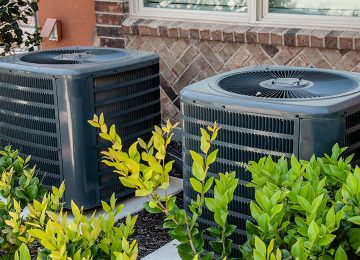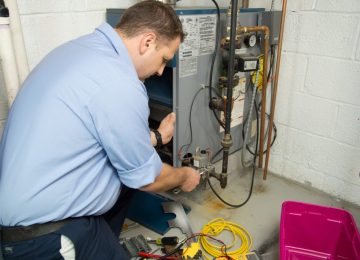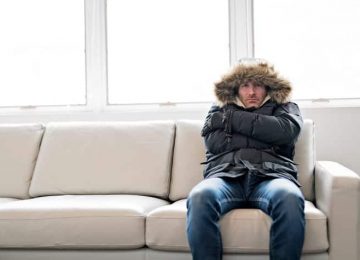It is not uncommon to have below freezing winter nights here in Denver, Colorado. Our furnaces are built to take these temperatures, but sometimes things just fail and you are left with a cold home. Fortunately, a lot of these common furnace problems and repairs can be avoided with proper maintenance from you and an HVAC contractor.
Here are 5 common furnace problems and what you can do to avoid them, saving you money and prolonging the life of your furnace.
1. Low airflow
This is a very common furnace problem, and it is often due to a dirty filter. Your furnace filter should be replaced at least once a year. If your filter is dirty, the amount of air running through the unit is limited, making it work harder to reach the temperature you set on your thermostat, and you’ll likely see a larger electric bill. Save money on hiring an HVAC contractor for a simple and inexpensive fix!
You will also notice this problem when your furnace is getting old, there is an issue with the fan or a leak in the ductwork, so make sure to get your furnace checked by a professional if the problem persists.
2. Cold air
If you notice cold air blowing through the vents, always check the thermostat first. The thermostat may have accidentally been set to “cool”, the batteries could be low, or the thermostat is set to “on” instead of “auto” which keeps the fan blowing air even when the furnace is not running.
Other causes of cold air coming from your furnace include a dirty filter, disconnected or leaky ducts, extinguished pilot light or a gas valve problem. Some of these can be avoided with regular filter changes and furnace tune-ups, but sometimes things just fail and need to be fixed by a professional.
3. Running nonstop
This problem can be caused by a dirty filter, but it can also be a sign of something more serious. Unfortunately, there are a lot of reasons this could happen, but the most common include a dirty filter, extinguished pilot light, a faulty thermostat, poor insulation, or a broken fan motor. If you notice your unit running nonstop, shut it off and inspect the filter and cleanliness of the unit. If the problem is not obvious, call an HVAC contractor so they can inspect every possible culprit.
This can be avoided by changing the filter and getting regular maintenance and tune-ups. A poorly maintained unit will not last as long and will need a lot of repairs as it ages.
4. Smell gas
If you smell gas or hear a hissing noise in or near your furnace, you need to shut off the furnace, open a few windows, evacuate your home, and call your local gas company or emergency services. Leaking gas can be caused by a cracked heat exchanger or a gas supply line issue. Make sure not to overheat your home as this can crack the heat exchanger and get your unit tuned-up regularly. An HVAC contractor will look for any signs that could lead to a gas leak.
5. Noise
It is normal for your furnace to make noises when starting up, but if you hear an abnormal noise like banging, scraping, or squealing, your furnace likely needs a repair. These noises should not be ignored as the broken part could be causing more damage. Call your local HVAC contractor, describe the noise and get a repair before you are forced to pay for more damage.
The only way to avoid a failing part is getting regular furnace tune-ups. HVAC contractors will look for parts that are worn and need to be replaced before completely failing.
Furnace Repairs in Denver, Colorado
CT Heating & Air in Denver will always show you the problem and explain how to maintain the unit so you can prevent another repair. Do not hesitate to call us, ask questions, or call for an emergency repair in the middle of the night. That’s what we’re here for.
Think you need a furnace repair in the Denver Metro Area? Call us or contact us online today!

![5 Common Furnace Problems and How to Avoid Them It is not uncommon to have below freezing winter nights here in Denver, Colorado. Our furnaces are built to take these temperatures, but sometimes things just fail and you are left with a cold home. Fortunately, a lot of these common furnace problems and repairs can be avoided with proper maintenance from you and an […]](https://ctheatingandair.com/wp-content/uploads/common-furnace-problems-how-to-avoid-them-denver-co-750x420.jpg)


